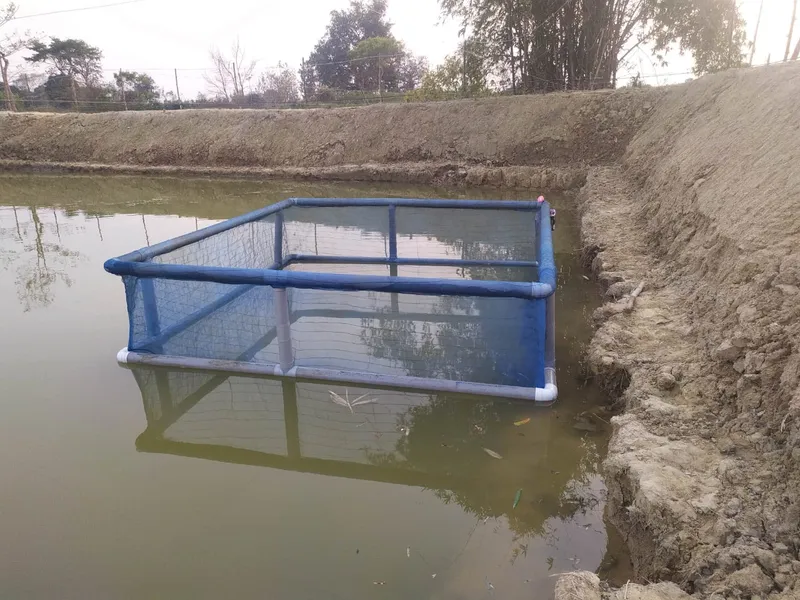
Social Alpha
View Brand PublisherHow Jaljeevika boosts the livelihood and employment generation of aquapreneurs
Focused on creating sustainable livelihood options, Jaljeevika is bringing about socio-economic advancement of women with accessibility and affordability in aquaculture.
Acting as a catalyst of change in the male-dominated occupation of fish farming, Jaljeevika has not only empowered women with financial independence but also given them social recognition in their community. ‘Matsya Sakhis’, as they are referred to, are responsible for educating farmers on how to prepare the pond, maintain the quality of pond water, and guide them on a day-to-day basis with respect to fish farming. With women acting as the backbone of the programme, this initiative by Jaljeevika has helped in establishing women as farmers and fisheries extension agents.
How it works
Jaljeevika has worked with 576 farmers in the Yavatmal district of Maharashtra. Through the Krishi Mangal program, the Pune-based NGO was able to increase the average incomes by 77 percent from the previous year. It has also created 132 micro entrepreneurs across the fisheries value chain including 15 Matsya Sakhis under the program.
By bringing the women extension agent – Matsya Sakhi – to centre stage, engaging with government programmes, and using digitised technology like the IOT-based sensor for providing pond-based advisory to the farmers, Jaljeevika is revolutionising the aquaculture value chain, helping it become a sustainable source of livelihood.

Socio-economic advancement of women
Matsya Sakhis are responsible for disseminating uniform technical knowledge for the pond upkeep to the farmer. They follow up with the farmers on their practices and provide handholding support in monitoring of processes on the farmer’s end. “We guide the farmers on how to prepare their pond, we provide them with good quality seeds, and the kind of fish food they need. We are also responsible for teaching farmers how to test pond water and ensure that the quality of water is maintained,” explains Matsya Sakhi Prajakta.
Before this initiative, the womenfolk were associated with women self help groups on credit and thrift programs, where not just their earning but also societal recognition was minimal. The ‘Matsya Sakhi’ initiative has helped them build more self confidence and generate substantial income for the household.
“These women have come forward as knowledge torchbearers in a male-dominated society. It’s not only the economic impact, but the dignity and social recognition that are the real wins for us,” says Neelkanth Mishra, Founder and CEO, Jaljeevika.
Overcoming challenges
One of the biggest challenges faced by Jaljeevika has been with regard to bringing in women as extension leads. Since pond assessment involved travelling long distances, the issue was initially met with a lot of resistance from the community. With support from their families, Matsya Sakhis could overcome the hurdle.
Further, the limited movement due to the ongoing pandemic not only slowed down the supply of IoT sensors but also delayed the pilot. Untimely rains and limited supply of fish seeds are other factors which contributed to reducing the potential impact of the programme.
However, ecosystem partnerships like those with Project Amplify, Frugal Labs, Daynil, and UMED have helped a great deal in meeting the various challenges head-on.
The Shabari initiative of the Tribal Department of Maharashtra has also been instrumental in making women more self-reliant. With the support from Jaljeevika, Mahila Navnirman Mandal has successfully received a grant of Rs 80 lakh from the initiative. Raising capital from mainstream government programmes has not only given them the access to better facilities but also instilled faith in their vision.
Role of Krishi Mangal in strengthening on-ground impact
Jaljeevika credits the Krishi Mangal programme for helping it converge technology and data analytics with the social process. The programme has helped tremendously in scaling the idea of reaching millions of fish farmers across the country. Jaljeevika has received immense benefit in terms of validation, technology upgradation, making the system more robust and user friendly for the fish farmers in the small to marginal categories.
While physical interaction and grassroot community intervention using extension services was helping the farmers to a certain extent, it was not scalable and made it very difficult to connect with larger numbers across different geographies. However, the Krishi Mangal program helped Jaljeevika to test the idea of using digital inclusion-based services to help scale in different topographies. Similar unified solutions could be provided and leveraged across the country, and the stakeholder engagement could also be leveraged through various community members in different geographical areas.
“We have piloted major scaling up opportunities through technological intervention thanks to the Krishi Mangal initiative,” adds Neelkanth.
Krishi Mangal has played a crucial part in helping digitise the process that took technology and knowledge to the remote parts of the community. Verifying and testing technology developed for fish farming, integration of value chain stakeholders, and support of government agencies are some of the vital roles played by Krishi Mangal in strengthening the on-ground impact of Jaljeevika.
“We aim to make it a common interaction platform, primarily through technology and apps, but also through this physical space. It is going to be a platform that brings together the entire aquaculture value chain,” says Neelkanth.
Before the Krishi Mangal initiative, the annual income generated from the 570 fish ponds in Yavatmal district was around Rs 1.8 crore, post the implementation of Krishi Mangal practices the endline data shows that the annual income had increased to Rs 3.9 crore. The programme has helped in doubling the income of the farmers in just one year of following the practices and extension agents led monitoring of the processes.
Post the Krish Mangal initiative, there has been a massive increase in the number of aqua schools. “We are developing more aqua schools, across bigger parts of Maharashtra, Bihar and Uttar Pradesh. The moment we reach 1,000 aqua schools, it means 1 billion farmers can be reached through extension and market linkages. This is another process validation that we received during the Krishi Mangal initiative,” quips Neelkanth.
The impact of Krishi Mangal has been commendable in creating different routes for income generation. There has been a tremendous increase in the interest shown by government agencies, banks, research institutions, and stakeholder engagement. With everyone coming forward to establish more community partnerships, the future depicts a new phase of linkages and partnerships in the digital platform as well as the aqua school model.







